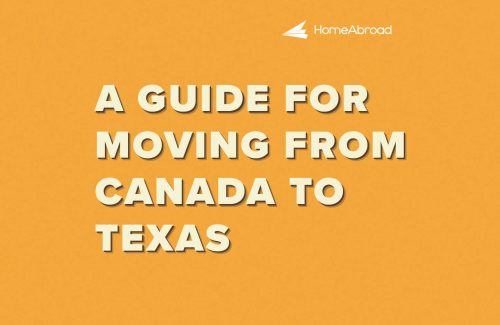Thinking about moving from Canada to Texas? You’re not alone! Many Canadians are making the move for better job opportunities, lower taxes, affordable housing, and a warmer climate.
Texas is known for its booming economy, no state income tax, and business-friendly environment, making it a great place to live, work, and invest in real estate.
But moving to a new country comes with many questions like What visa do you need? How much does it cost to live in Texas? What should you expect when settling in? This guide covers everything you need to know.
Let’s explore how you can make your move to Texas seamless and stress-free!
Table of Contents
How to Move from Canada to Texas: Step-by-Step Guide
Relocating from Canada to Texas requires careful planning, from securing the right visa to understanding financial and lifestyle adjustments. Here’s a step-by-step guide to help make your move smooth and stress-free.
Step 1: Choose the Visa Type
Before moving, you need to secure the appropriate visa based on your purpose—whether for work, study, business, or family reasons.
1. Student Visa
If you plan to study in Texas, you’ll need one of the following:
- F-1 Visa – For full-time students attending US colleges or universities.
- M-1 Visa – For students enrolling in vocational or technical schools.
- J-1 Visa – A visa for Canadians who are part of educational exchange programs, including students, scholars, and professors.
2. Work & Business Visas
For professionals and business owners, these visas allow temporary or permanent residence in the US.
- TN Visa – Easiest option for Canadian professionals under USMCA (formerly NAFTA). Requires a job offer in an eligible profession.
- H-1B Visa – For skilled professionals in specialized fields like IT, finance, and healthcare. Requires employer sponsorship.
- L-1 Visa – For employees transferring within a multinational company from a Canadian office to a US branch.
- E-1 Visa – A Treaty Trader visa for Canadians engaged in substantial trade between the US and Canada.
- E-2 Visa – A Treaty Investor visa for Canadians investing in and managing a business in the US.
- O-1 Visa – For individuals with extraordinary abilities in sciences, arts, education, business, or athletics.
3. Family Sponsorship Visa
Canadians with close family members in the US may qualify for a family-based visa:
- K-1 Visa – For fiancés of US citizens who plan to marry and live in the US.
- Immediate relative visas – Includes IR1 and CR1 for spouses, IR2 for children, and IR5 for parents of US citizens, allowing them to obtain a Green Card.
- Family preference visas– Includes F-2A/F-2B for children and spouses of permanent residents, F3 for married children of US citizens, and F4 for siblings of US citizens.
4. Immigrant Visas
For Canadians seeking long-term residence or investment opportunities in the US, these visa options provide a path to a Green Card.
- EB-5 Investor Visa – A direct path to a Green Card for investors who contribute at least $800,000 into a qualifying US business and create jobs.
- EB-1 Visa – For individuals with extraordinary abilities, outstanding researchers, and multinational executives. It often leads to permanent residency without employer sponsorship.
- EB-2 Visa – For professionals with advanced degrees or exceptional abilities. Some applicants may qualify for a National Interest Waiver (NIW), bypassing employer sponsorship if their work benefits the US.
- EB-3 Visa – For skilled workers, professionals, and other workers with a permanent US job offer. Requires employer sponsorship.
By selecting the right visa type, you can ensure a smooth transition and maximize your opportunities for work, study, or investment in Texas.
Step 2: Gather Necessary Documents
Once you’ve chosen the right visa, the next step is to prepare the required documents. Having everything in order will make the application process smoother. Common documents include:
- Valid Passport – Ensure your Canadian passport is valid for the duration of your stay.
- Visa Application Forms – Depending on your visa type, you may need to complete forms like DS-160 (for nonimmigrant visas) or I-130 (for family-based Green Cards).
- Proof of Financial Stability – Bank statements, employment letters, or sponsorship details to show financial capability.
- Educational and Work Records – Diplomas, transcripts, employment verification letters, or business ownership proof for work or student visas.
- Marriage or Birth Certificates – If applying for a family-based visa, these documents prove your relationship with a US citizen or resident.
- Health and Police Clearance – Some visas may require a medical examination or background check to confirm eligibility.
Apart from these, additional documentation may be required depending on your specific visa type. It’s best to check the latest requirements from official US immigration sources.
Step 3: Finding a Place to Live
Securing a home in Texas is one of the most important steps in your move. Whether you plan to rent or buy, Texas offers plenty of affordable housing options compared to major Canadian cities.
If you’re renting, ensure that you carefully review lease terms and utility costs. If you’re buying, working with an expert real estate agent and exploring foreign national mortgage options can make the process smoother.
If you’re a Canadian looking to buy a home in Texas, HomeAbroad offers tailored mortgage solutions designed specifically for Canadian buyers. With years of experience working with foreign nationals, we simplify the financing process and help you secure the right loan for your new home.
Finding the perfect place to live in Texas depends on factors like job opportunities, lifestyle preferences, and affordability. Here are some of the best cities for Canadians moving to Texas:
- Austin: A major tech hub with a booming job market, excellent entertainment, and a vibrant cultural scene. It’s an ideal place for young professionals and entrepreneurs.
- Houston: Known for its strong economy, Houston offers opportunities in energy, healthcare, and aerospace. The city has diverse communities, and a lower cost of living compared to many major US cities.
- Dallas: A financial and business hub with excellent job opportunities, great schools, and family-friendly neighborhoods. It also offers a lower cost of living than similar metropolitan areas.
- San Antonio: One of the most affordable cities in Texas, San Antonio has a rich cultural heritage, strong job prospects, and a lower cost of living, making it a great option for families and retirees.
Each of these cities offers a unique living experience, so choosing the right one depends on your lifestyle, career goals, and housing preferences. Here is a detailed guide to finding the best place to buy a house in Texas.
Step 4: Planning Your Move: Shipping and Relocation Options
Once you’ve decided to move to Texas, the next step is figuring out how to transport your belongings efficiently. Whether you’re moving a few essentials or relocating an entire household, choosing the right shipping and relocation method can make the process smoother.
1. Hiring a Professional Moving Company:
Many moving companies specialize in cross-border relocations from Canada to the US They handle customs paperwork, logistics, and safe transportation of your belongings.
2. Shipping Your Belongings
If moving a large number of items, shipping via freight may be more convenient. If moving with minimal belongings, renting a moving truck and driving across the border could be a cost-effective option.
3. Driving Your Own Vehicle
If you plan to bring your car, ensure it meets US regulations. You’ll need to register it in Texas, get insurance, and pay any applicable import duties. Alternatively, you can hire an auto transport service to ship your car safely across the border.
4. Customs and Documentation Requirements
When moving to the US, you must declare household items and ensure they comply with customs regulations. Key documents include:
- A detailed inventory of your belongings
- Proof of residency or visa documentation
- Vehicle import forms (if applicable)
Planning ahead and choosing the right moving method can make your transition to Texas seamless, ensuring your belongings arrive safely and on time.
Step 5: Setting Up Essentials in Texas
Once you’ve moved, the next step is getting everything in place for your new life in Texas. Here’s what you need to take care of:
- Opening a US Bank Account: A US bank account is essential for managing daily expenses, receiving salaries, and paying bills. Many banks allow non-US residents to open an account, check the specific requirements before visiting a branch.
- Getting a Driver’s License: If you plan to drive, you’ll need to obtain a Texas driver’s license within 90 days of moving. Depending on your previous driving history, you may need to take a written and driving test.
- Setting Up Utilities and Internet: Ensure your home is ready by setting up electricity, water, gas, and internet services. Various providers offer different plans, so comparing options based on your location and needs is recommended.
- Enrolling in Healthcare: Before leaving Canada, contact your healthcare providers to transfer medical records to your new healthcare providers in Texas. Having up-to-date medical records ensures seamless access to medical care when needed. Since the US healthcare system differs from Canada’s, securing health insurance is crucial.
Moving from Canada to Texas is an exciting step, but proper planning is key to ensuring a smooth transition. From securing the right visa and finding a home to setting up essential services, each step brings you closer to settling into your new life.
Once you’ve completed these steps, take time to explore your new surroundings, connect with local communities, and embrace the opportunities Texas has to offer. With the right preparation, your move can be a seamless and rewarding experience.
Why Are Canadians Moving to Texas?
Texas has become a top choice for Canadians looking to relocate due to its strong job market, lower taxes, affordable housing, and warm climate. Here’s why so many people are making the move:
1. Strong Job Market
Texas offers excellent job opportunities in industries like technology, healthcare, energy, and finance. Cities like Austin, Houston, and Dallas have a growing demand for skilled professionals, making them great places for career growth.
As of December 2024, Texas has an unemployment rate of 4.2%, reflecting a strong and resilient job market with plenty of opportunities for both local and international job seekers.
2. Higher Average Salary
Texas offers competitive salaries across various industries, often exceeding those in Canada for similar roles. As of 2025, the average salary in Texas is $57,076 per year. In comparison, the average salary in Canada is $68,120 CAD, which converts to approximately $47,390.63 USD.
This means that professionals in Texas generally earn more in USD while also benefiting from a lower cost of living and no state income tax. As a result, they can retain more of their earnings and enjoy a better quality of life compared to many Canadian cities.
3. No State Income Tax
One of the biggest financial advantages of living in Texas is that there is no state income tax. Unlike Canada, where income tax rates can be high, Texas residents get to keep more of their earnings, making it a financially appealing place to live and work.
4. Affordable Housing
Texas offers some of the most affordable real estate in the US, especially compared to cities like Toronto and Vancouver. As of 2025, the average home value in Texas is around $299,959, whereas in Canada, it’s $722,221 CAD(approximately $499,685 USD)—significantly higher. Whether you’re looking to buy a home or rent, housing costs in Texas are significantly lower, making homeownership more accessible for Canadians moving to the state.
5. Warm Climate All Year Round
For those tired of Canada’s harsh winters, Texas provides a warm climate throughout the year. Cities like Houston, Austin, and San Antonio enjoy mild winters and long summers, offering plenty of sunshine and outdoor activities.
6. Business-Friendly Environment
Texas is known for its pro-business policies, including lower corporate taxes and fewer regulations. This makes it an excellent destination for entrepreneurs and business owners looking to expand or start a company.
Cost of Living in Texas
One of the biggest reasons Canadians choose to move to Texas is the lower cost of living. While costs can vary by city, Texas generally offers more affordable housing, lower taxes, and cheaper everyday expenses compared to many parts of Canada. For example, living in Houston is about 7% cheaper than in Toronto, making Texas an attractive option for those seeking financial stability.
Everyday expenses such as groceries, gas, and utilities tend to be lower in Texas. Gas prices, in particular, are much cheaper due to lower fuel taxes, making transportation costs more manageable. The absence of a state income tax in Texas allows residents to keep more of their earnings, further reducing overall living costs.
While the cost of living varies depending on the city, Texas generally provides a more affordable lifestyle, making it an attractive destination for Canadians looking for financial stability and a better quality of life.
Final Thoughts: Making Texas Your New Home
Moving from Canada to Texas is an exciting journey filled with new opportunities. With its strong job market, affordable housing, and no state income tax, Texas offers a great quality of life for Canadian expats. By understanding the visa process, securing housing, and preparing for the cost of living, you can ensure a smooth transition.
Whether you’re relocating for work, business, or a fresh start, proper planning will make your move stress-free. If homeownership is part of your plan, HomeAbroad is here to help you secure the perfect mortgage solution tailored for Canadian buyers.
Start your journey today and make Texas your new home with confidence!

Find the best real estate agent with international expertise
Connect with a HomeAbroad real estate agent in your area.
Frequently Asked Questions
Is it hard for a Canadian to move to the US?
Moving to the US from Canada is a simple but straightforward process. However, it does require extensive paperwork, visas, and other documents. Later, you can also apply for a permanent resident green card. It’s important to do your research and plan ahead before you move so that you don’t run into any unforeseen issues during the process.
Can I work in Texas as a Canadian citizen?
Yes, you can work in Texas as a Canadian citizen. You must obtain the appropriate visas and paperwork before starting any job. Additionally, it’s important to research potential job opportunities before moving to get an idea of what’s available to you once you arrive.
Can Canadians buy a home in Texas?
Yes! Canadians can buy property in Texas without restrictions. They can even secure a mortgage in the US. At HomeAbroad, we provide tailored mortgage options for Canadian buyers, making homeownership in Texas easier. To learn more, check out our detailed guide on Can Canadians Buy Property in the USA.
How long can a Canadian stay in Texas?
Canadians can stay in Texas (or anywhere in the US) for up to six months (180 days) per year as a visitor without a visa. However, for longer stays, a visa or residency permit is required.
At HomeAbroad, we ensure the reliability of our content by relying on primary sources such as government data, industry reports, firsthand accounts from our network of experts, and interviews with specialists. We also incorporate original research from respected publishers when relevant. Discover more about our commitment to delivering precise and impartial information in our editorial policy.
U.S. Bureau of Labor Statistics: https://www.bls.gov/eag/eag.tx.htm#eag_tx.f.r
Statista : https://www.statista.com/statistics/604228/median-house-prices-canada/
Statistics Canada: Employee Wages
Expertistan: https://www.expatistan.com/cost-of-living/comparison/toronto/houston?



















